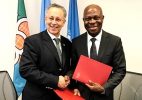The African, Caribbean and Pacific (ACP) Group of States and the International Fund for Agricultural Development (IFAD) agree to collaborate and support the implementation of development goals in their common Member States.
Patrick Gomes, Secretary-General of ACP and Gilbert Houngbo, and President of IFAD Gilbert Houngbo, signed the agreement to collaborate on Tuesday in New York, United States of America, on the margins of the 73rd session of the United Nations General Assembly.
Following the signing ceremony, Mr. Houngbo stated that “it is crucial that our synergies be strengthened, as we seek to ramp up efforts to eliminate hunger and poverty, while offering a sustainable future and an alternative to migration, to rural youth.”
Dr. Patrick Gomes declared that “today marks an important day for the ACP Group, as we sign this letter of intent with the IFAD, aimed at supporting women and youth, in particular, along the agricultural value chains. We believe that this collaboration between the two institutions will contribute to the goal of poverty reduction and promote sustainable and inclusive growth in ACP economies.”
The agreement will enable the two institutions to strengthen their synergies and complementarity, at a time when current global challenges, including the fight against hunger, migration, climate change, youth employment, and nutrition require a coordinated and heightened response.
IFAD and the ACP Group plan to intensify their collaboration in several areas of common interest, including joint financing, research, studies, and policy dialogue.
IFAD is already a partner of ACP governments, in the design and financing of rural and agricultural development programmes. Its loan and grant portfolio provides support for 106 ongoing projects in ACP countries, including 93 in Africa.
In 2018, 18 new projects are expected to be launched, for a total amount of USD 466 million in loans. IFAD also supports innovation by financing specific projects, and is engaged in policy dialogue on countries’ agricultural and rural development issues.

